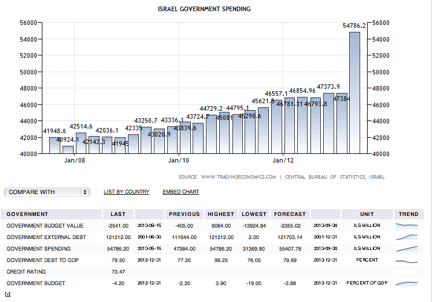Fix the money system before it destroys Israel

An excellent article by Bill Still has been published in one of two leading Economics magazines in Israel The Marker on 3rd October 2013.Here you can read the English version:
Israel has a reputation for using its resources wisely. Surprisingly, however, the Israeli government issues only 7% of its money. About 93% of the circulating money is created by commercial banks. The banks create new money every time they issue a new loan. It’s called “credit money” and it is simply electronic digits in a computer, which spends just as well as a shekel note.
This system not only allows banks to decide how money is directed in the economy, it also lets them collect interest and foreclose on assets put up as collateral on money they created out of nothing.
This is not only unfair, but unwise. It does not provide all citizens with an equal chance through an incentive-driven system and will bring ruin to the Israeli economy.
The problem with debt-based money is it gradually concentrates money into very few hands, including politicians unwilling to take a stand. As a lucky few acquire more and more assets, they tend to invest them into the real estate market. On top of that, banks are corporations and corporations are forced into a competition for borrowers. So Israeli banks have been caught in the same trap as U.S. banks were by offering loans to higher-risk borrowers through adjustable rate mortgages. This explains the rising cost of housing which is disproportional to any income growth for the average citizen.
It’s nothing but a bubble that depends on continual growth. That’s one of the reasons the Bank of Israel recently lowered interest rates to a record 1% — to encourage even more borrowing.
At some point, the invisible hand of the market will put an end to this, but banks are now fully aware that once the bubble collapses, the taxpayers will bail them out as they did in the U.S. — privatizing profits but socializing losses – a win/win for banks, but a lose/lose for taxpayers.
Why Haven’t We Heard About This Before?
To disguise the root problem, the few who benefit from the current system try to frame the public discussion in terms of two diametrically opposed arguments; the socialist model versus the faux-capitalist model. Neither will work and here is why.
1. The Socialist model believes that more government spending will cure the imbalances. But more spending means more government borrowing; and that means more interest payments and more control of the politics by the lending class. At this point 1/3 of Israeli government expenditures go towards servicing past debts – both interest and principle payments.
So the Socialist model tries to cure a debt problem with more debt. It’s like trying to cure a drinking problem with more whiskey.
2. The Faux-Capitalist model encourages so-called “free market” solutions and pushes for further austerity measures – cutting government spending. This is politically popular with middle class voters who shoulder the increasing tax burdens, but when mixed with loose regulatory policy over the banks, money creation by banks can never serve the public interest.
The Israeli economy is in trouble. Government spending jumped up by 8.6% in the second quarter of 2013, a 7.4 ILS billion increase — in a single quarter!

More troubling
More troubling is that 77% of this increase was borrowed – pushing the national debt to 121 ILS billion or 79.5% of GDP.[1] According to the BIS, an 80% debt-to-GDP ratio is when rising debt begins to punish GDP,[2] eventually becoming unsustainable.
The U.S. is well past this threshold now, with a 107% debt-to-GDP ratio. It’s economy is now dependent on one-trillion dollars per year of raw money creation by the Federal Reserve, known as “quantitative easing.” This, too, must end badly.
For comparison, Turkey’s booming economy has grown at an average of 5.1% over the past 10 years. Their debt-to-GDP ratio to only 36%,[3] and they seem determined to make their money system serve the public interest.
How do we fix it?
Israel needs to wake up before it is irrevocably drawn into this death spiral of debt that has engulfed the U.S. economy and the EU’s. The good news is it’s not difficult to fix. The Israel Monetary Change Movement has put together a beautifully simple plan to extricate Israel.
The plan would simply change the ratio of bank-issued money to government-issued money. For example, in the first year, the Knesset could cap bank money at, 85%, and double government money up to 15%. Then, if metrics showed an improvement, the next year, they could boost the ratio again, to 70% bank money and 30% government money. In this way, there would be no undue shocks to the economy.
This is a reasonable approach that the Knesset should consider. It gradually reduces the leverage that the debt-money system is based upon and puts the Israeli economy on a more stable footing.
Bill Still (www.billstill.com) is a former newspaper editor, best-selling author, and award-winning documentary film director. He has written for USA Today, The Saturday Evening Post, the Los Angeles Times Syndicate, OMNI magazine. His latest book is entitled: No More National Debt (2011). In 2011-12 he ran for the nomination of the Libertarian Party for President of the United States
[1] http://www.tradingeconomics.com/israel/government-spending, retrieved Sept. 27, 2013
[2] http://www.bis.org/speeches/sp130623.pdf, retrieved Sept. 27, 2013
[3] http://www.tradingeconomics.com/turkey/government-debt-to-gdp, retrieved Sept. 27, 2013